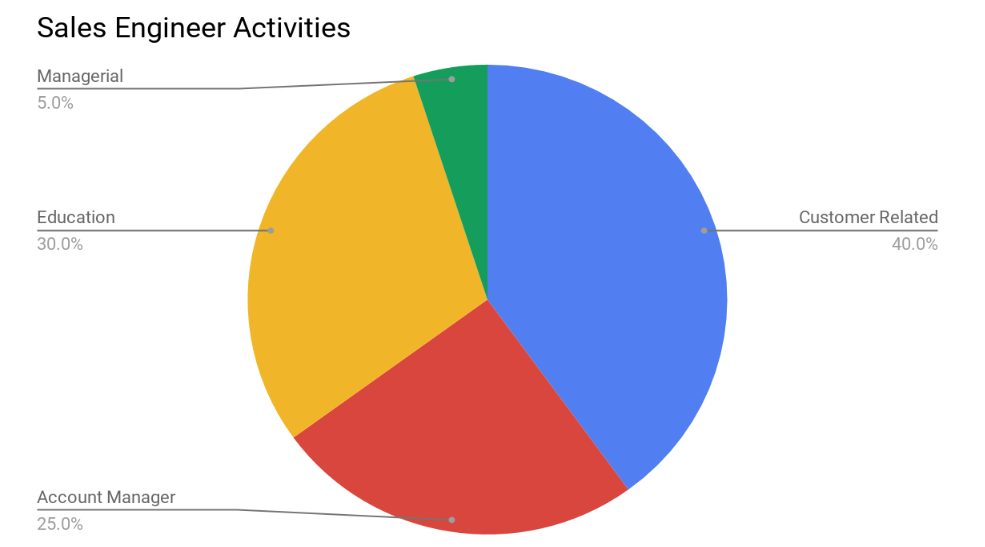Sales Engineer’s Daily Activities

By Ramzi Marjaba
Sales Engineers can be compared to very specialized NFL Running Backs. Except instead of having one Quarterback, we have multiple Quarterbacks.These Quarterbacks could be anyone from Account Managers, Customers, Sales Engineering Managers, and the list goes on.This means that Sales Engineers are constantly working hard to keep multiple people happy, and their daily activities reflect that effort.
In the rest of the blog post, I’ve classified a Sales Engineer’s activities on a daily, bi-weekly or weekly basis (By the way, did you know that Semi-daily means twice a day? How does that make sense?). These activities include Customer-oriented Activities, Account Manager Support Activities, Educational Activities, and finally some Managerial Activities. The most important one here would be the Customer-related activities, followed by a tie between Account Manager Support and Educational activities. The Managerial Activities usually end up at the bottom of the task list to the Sales Engineer’s Manager’s chagrin.

Here are the activities, divided by section:
Customer-Oriented Activities:
It goes without saying that Sales Engineers look after pre-sales activities, duh! These activities include meeting customers along with Account Managers, preparing for presentations, demonstrations, proof of concepts and evaluations. These are the headliners of every Sales Engineers job, and can be found in pretty much every job descriptions as the responsibilities of Sales Engineers.
One of the most important activities that a Sales Engineer should be doing is building relationships with customers. Some, and I hope that is the minority of people, believe that it is solely the responsibility of the Account Manager. The Account Manager-Customer relationship is, although a very important one, a different kind of relationship. The Sales Engineer on the other hand, is what I like to call the trusted advisor to the customer. This means that the Sales Engineer will have to build the relationship, which can be done through daily activities such as answering customer questions, addressing their concerns, etc. These questions could either come up during a presentation, a demonstration, or just come up randomly a couple of days after the customer puts in the Purchase Order (PO).
When a Sales Engineer receives a question from a customer, no matter when, an Sales Engineer must be responsive and get back to the customer about it, as soon as possible. After talking to a few customers, this seems like a very important attribute that they like in Sales Engineers. Anthony Taok in Show 29 of the We theSales Engineers podcast confirmed that as well. Keep in mind that responsiveness does not necessarily mean providing an answer on the spot. Customers are aware that Sales Engineers work with many customers, some travel and are not always available to answer the questions on demand. Sales Engineers also may not have the answer right away and need to do some research. Responsiveness could be as simple as letting the customer know that you have received the question and are researching it. I like to end the email with, “I can get you an answer on XX date, does that work for you?” This usually gives me an idea of how urgent the question is. I also offer a teammate’s services if they need the response earlier. Keep in mind that if there is a purchase order on the line, get the answer as soon as possible and call the customer with the answer to gauge if the response is acceptable.
Other activities that can and should be done to build the relationships are dropping in to see a customer (if you have access to a customer site), emailing the customer or calling them for work related topics, or even personal topics.
More activities in this are are post-sales activities. This is very dependent on the company you work for and what you sell. Some companies don’t want their Pre-Sales Engineers doing post sales activities, and some do. Even if you are not supposed to be doing post-sales activities, the Sales Engineer owns the relationship with the customer, so it is their job to make sure that the customer is happy in the end. So the Sales Engineer would find the resource to help, follow up with the customer and the resource or actually go onsite to meet with the customer or to assist.
Account Manager Support Activities:
Now that we supported our customer, we have to support our Account Managers so that they can continue selling and we can together excel in our job to hit our quota.
Supporting an Account Manager will differ from one Account Manager to another. Some need lots of hand holding, others are able to survive in the wild on their own.
Keep in mind that I’m saying these are the activities we are doing as part of our job. This is not going above and beyond, although that is always encouraged. Here are some of the activities:
Working on Proposals:
After meeting customers and depending on how good of a job you’ve done during discovery, you should have an idea of what is needed to solve their problems. Things can change while you progress and go through the demo and proof of concept, but you should be able to have an inkling of what is needed. This will allow you to come up with a draft proposal which would include all the hardware if that is what you sell, licenses, applications or services needed.
By the way, this also includes the formal responses to Requests for Proposals (RFPs), Request for Information, Tender, or Quotations (RFI, RFT, and RFQ).
Answering Account Manager Questions:
It’s not just the customers who have questions for the Sales Engineer. Account Managers, based on my experience, usually have a lot more questions. Most Account Managers that I know are control freaks. They have to be, half of their income relies on them controlling their destiny.
This usually leads them to ask questions such as where are we in the POC, does the customer have everything they need, what is that part number you added on the proposal?
The biggest impact that Sales Engineers can have is to explain the proposal to the Account Manager so they can then go in front of the customer and defend it confidently.
I will not include meeting customers with the Account Manager here as I view them as customer oriented activities. There are however cases where the Sales Engineer is there solely to support the Account Manager. For example if the Account Manager is brand new to the company and does not know how to qualify a customer, then it is up to the Sales Engineer to do that with them. Sales Engineers also train new Account Managers on the products that they sell. This is more the case when there is a one to one relationship between Sales Engineers and Account Managers.
Some other tasks that I was involved in when I had to break in a new Account Manager (you know who you are and you know I love you) was to attend pricing calls with Product Managers so I can translate between the Product Manager and my Account Manager.
As a summary, the activities that a Sales Engineer will do to support the Account Manager will vary from one Account Manager to the next.
If there are some activities you do to support your Account Manager that were not mentioned, please let us know about them below.
Education:
The way I see it, there are three aspects we need to focus on to educate ourselves, and within each one, there might be different combinations. I will explain. The three pieces of education include 1) learning new features/products in the portfolio, 2) learning new technologies and obtaining certifications, and finally 3) learning or improving soft skills.
Almost every company I know of comes up with new features or products to increase their market share, or simply to keep up with the times. What differs between one company to the next is the amount of training that they provide their sales team, more specifically their Sales Engineers on their product, how to sell it, and what problems it solves. Companies like Cisco, Salesforce and others have formal training which Sales Engineers have to go through to learn new features and technologies. On the other extreme, some companies provide a Product or Marketing Manager to deliver a presentation to Sales Engineers to explain how cool the product is, which in my mind is completely useless.
In many cases, it is up to the Sales Engineer to work on their own education. The way I like to do it is to set myself a specific learning goal and then work towards it. For example, a goal could be “In 3 months, I want to be fluent in EVPN” or “I want to get my CCNP Security Certification in 3 months”. That means for the next 3 months, any educational time I have, is dedication to this goal (Side note: if you saw my blog “A Week in a Life of an SE” you will know that I have Friday afternoon booked for this purpose). Goals will change from one Sales Engineer to the next. When I first started as an SE and figured out the basics, I felt aimlessly wandering from one feature on one product to the next and for the first while, I struggled to make any progress. Setting goals and time aside, even 4 hours on Friday afternoon helped me improve greatly.
Managerial
The final form of activities is the managerial activities. This usually falls by the wayside for me and for many of the Sales Engineers that I know. This includes submitting expenses, tracking equipment (if you sell hardware), jumping on team calls, updating your CRM, and performance reviews. All careers have this type of responsibilities. Sales Engineers are not unique in this aspect. The big difference I would say is that most Sales Engineers are far enough from their manager not to get bugged as much as other folks, and we have an excuse for not answering the phone, which is often “we’re with customers”! (shhh, don’t tell anyone.)
I’d love to hear about your daily, weekly or monthly activities. If you see anything differently, or you want to add something, the comments section is for you.
Related Blog Posts:

This Post Has 2 Comments
In my experience, I have to include activities with the Product team.
Ramesh
That is very true. In my mind that would still count as a customer related activity because I can’t think of a reason where I would contact the Product team if not to answer a customer question.
Are you talking about other activities involving the product team?